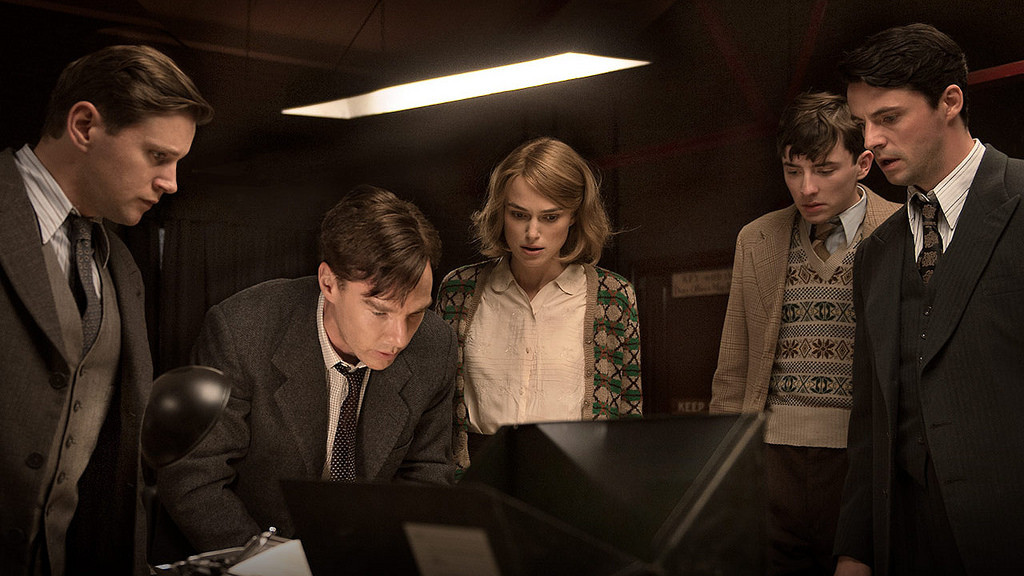Review of The Imitation Game
The first words to be heard in this film is the character of Alan Turing, played by Benedict Cumberbatch, asking “are you paying attention? You will listen closely and you will not judge me until I am finished.” These lines are as much directed at the audience as they are the character he is addressing. It is a line that becomes more relevant once Turing’s incredible story is revealed.
The Imitation Game is the story of Alan Turing, a British mathematician who was recruited by MI6 during World War Two to crack the Enigma code, which the Nazi forces were using to code their transmissions. It is a look at his work at Bletchley Park, where he created a machine capable of cracking the code. It also explores his relationship with the other members of his team and finally, the persecution he faced due to being homosexual.
The first point to raise is that this is a movie driven by the strength of the performances by the cast. In the supporting cast, Matthew Goode, recently seen as the murderous Charlie in horror film Stoker is very solid, portraying womanising cad Hugh Alexander with just enough arrogance and charm to remain likeable for the most part. Charles Dance, who most people will now know as Lannister patriarch Tywin from Game of Thrones, plays base commander Alastair Denniston. He is constantly looking for a reason to get rid of Turing throughout his time at Bletchley Park, and is arguably the film’s main antagonist, if you don’t count the Nazis. The final actor worth mentioning in the supporting cast is the always dependable Mark Strong, who once again impresses with his performance as MI6 agent, Stewart Menzies. His character is very likeable as he understands Turing’s true genius, but there is just enough in his performance to remind that he could still be very menacing.
In terms of the main cast, Keira Knightley is good as semi love interest Joan Clark. Her acting has come a long way from when she was dubbed Ikea Knightley by critic Mark Kermode for her wooden performances in the Pirates of the Caribbean franchise. But, the plaudits should be, and have been, aimed at Benedict Cumberbatch for his truly incredible performance as Turing. Cumberbatch is an actor who has shown his versatility throughout the last few years, with his work as Sherlock Holmes in Sherlock, Smaug in The Hobbit and as the villainous John Harrison in Star Trek Into Darkness. With his performance here, he may have possibly outshone all his previous work. It is a performance filled with nuance and subtlety. It is emotional when necessary but also intelligent as it never goes into the realms of over-acting. Towards the end, and without spoiling anything, the performance was of such a high level to reduce this reviewer to floods of tears. It is a beautiful performance and quite frankly, is deserving of at least an OSCAR nomination for Best Actor, if not the award itself. One other actor who is deserving of mention is Alex Lawther, who portrays Turing during his school years. His is also a performance delivered with absolute perfection. He is an actor who we should see a lot more of in the years to come.
Another impressive point to raise regarding the movie is the directing. Morten Tyldum, the director of the brilliant Norwegian film Headhunters, makes his English language début here and does a very good job. The shooting is detailed throughout and it can be seen that Tyldum is confident with different aspects of shooting, whether it be five people in a small room or the bomb-ravaged streets of London. There is never a shot which feels perfunctory or unnecessary.
To sum up. The Imitation Game is quite frankly brilliant and one of the best British films in a long time. It provides smiles and, in this reviewers case, heartbreak and tears. It is a film that shows the very best of what people can achieve but also, sadly, the worst of people destroying it. All that can be said is see this movie. Alan Turing is a hero and deserves to be seen as such. Hopefully, this film will show that to the world, as it should.

